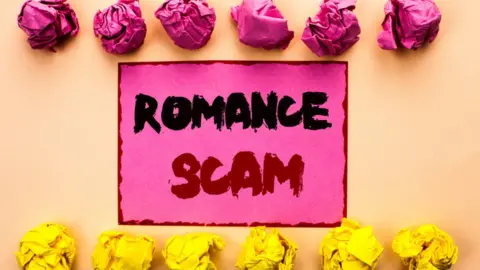NI women lose £105,000 in online 'romance scams'
 Getty Images
Getty ImagesTwo women from Northern Ireland caught up in romance scams have lost a total of nearly £105,000 in the last fortnight, police have said.
They had been befriended by men online who duped them into sending money.
In the first 10 months of last year, police received 39 reports of dating scams in Northern Ireland, when more than £218,000 was taken.
This was "alarming", they said, but they believe romance scams are significantly under-reported.
"We think many people are simply too embarrassed to tell us they have been scammed in a romance fraud," said a spokesperson.
In one of the two recent cases, a man claimed he was in the US Army. He was in touch with a woman in Northern Ireland for about a month before their relationship became romantic.
From May 2018, he told her he was being held by authorities in Africa and needed money to get out.
"She truly believed this man was genuine as she had found a profile online that matched his details," said police.
She was conned into sending him £65,000.
 Getty Images
Getty ImagesThe second report involved a woman who was talking online to a man who claimed he was an engineer living in the USA.
They had been in touch since November and the man eventually asked the woman for money. She believed his story and sent him £40,000.
PSNI Ch Super Simon Walls said: "Sadly, for these two women they will not get their money back as they gave it to the fraudsters voluntarily.
"These reports illustrate how scammers don't care about their victims; that they're happy to take advantage of people's vulnerability and good faith.
"Unfortunately, there is no end to the methods fraudsters will use to dupe people into giving them money."
In the run-up to Valentine's Day, police are warning that romance scammers do not prey on a specific gender, sexuality, race or age.
They urged people who use the internet for romance to protect themselves.
Their advice is:
- Start off with a reputable website
- Look out for someone asking lots of questions, but not giving any detail about themselves
- Do not ever hand over any money or send goods such as iPhones or iPads
- Never let anyone you do not know or trust transfer money into your bank account
The BBC has highlighted a number of cases in recent years including one woman who lost more than £300,000 and said she felt emotionally "brutalised". She thought she was paying money to her new love interest for food, rent and medical bills.
In another case, a lonely 86-year-old man said he was left suicidal after a woman he messaged through online dating, but had never met, conned him out of £6,000.

Online safety advice
- Criminals who commit romance fraud trawl through profiles and piece together information such as wealth and lifestyle, in order to manipulate their victims
- Police can investigate and help to provide support, but often cannot get the money back
- It is very simple for fraudsters to cover their tracks by masking IP addresses and using unregistered phone numbers
- Never send money to someone online you have never met
- Think twice about posting personal information which could be used to manipulate or bribe you
